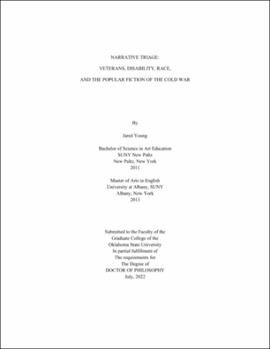| dc.contributor.advisor | Grubgeld, Elizabeth | |
| dc.contributor.author | Young, Jared | |
| dc.date.accessioned | 2023-04-05T16:21:28Z | |
| dc.date.available | 2023-04-05T16:21:28Z | |
| dc.date.issued | 2022-07 | |
| dc.identifier.uri | https://hdl.handle.net/11244/337336 | |
| dc.description.abstract | This dissertation argues that there are a series of disability narratives embedded James Jones, Norman Mailer, and John Oliver Killens’ novels that undermine the cultural myths revolving around soldiers’ bodies. Following the Attack on Pearl Harbor, President Franklin Delano Roosevelt called on Hollywood to keep the public abreast of the nation’s war efforts. The Office of War Information was established in 1942 to assist with this task. What was intended to be an objective office that reported honestly on the complex issues of the war, however, became something more controversial. Under military and government pressure, the OWI implemented a series of stipulations that ensured the U.S. Armed Forces and its operations were favorably portrayed in motion pictures. As a result, the public consumed curated representations of the war that mythologized their understanding of soldiers’ experiences, including what happens to their bodies in combat. In what I term narrative triage, Hollywood films aesthetically rehabilitated representations of war wounds for the sake of mobilizing support. In some cases, these representations symbolized heroism, appealing to the audience’s patriotism. Other times, they reinforced the racial stratification of a pre-civil rights America, as Black GIs’ injuries signified their inferiority. Elsewhere, they were restored through medical treatments, easing viewers’ anxieties over the long-term effects of war wounds. And, above all, they were rewarded with medals, women, and job promotions, leading audiences to believe that wounded soldiers may struggle as a result of their injuries, but would nevertheless find optimistic endings. | |
| dc.description.abstract | The war fiction by James Jones, Norman Mailer, and John Oliver Killens, as the chapters of this dissertation examine, undermine such Hollywood myths. As I will show, the writers’ representations of service-related disabilities serve as embodied experiences that impact the characters’ social, gendered, racial, and military identities. They accomplish these portraits for two reasons. First, each served in the U.S. Army during the SWW, witnessing firsthand—and in some cases experiencing—the somatic and traumatic damage that occurred during the political conflict. Second, the writers were not held to the same OWI stipulations as the film industry. By resisting narrative triage and relying on their ethos, then, the veterans portray war wounds in ways that draw attention to the military’s complex relationship with the body, uncover the self-serving aspects of military medicine, question the efficacy of postwar remasculinization, and expose the physical ramifications of a segregated Jim Crow Army. Framed with recent disability scholarship and historical accounts, my dissertation suggests their novels challenge cultural memories of the war and its material effects on the men who served, and do so at a critical moment in the nation’s history. While the U.S. increasingly relied on cultural productions to fortify its image during the Cold War, the veteran writers’ work collectively posits the nation was not as inviolable as it seemed. | |
| dc.format | application/pdf | |
| dc.language | en_US | |
| dc.rights | Copyright is held by the author who has granted the Oklahoma State University Library the non-exclusive right to share this material in its institutional repository. Contact Digital Library Services at lib-dls@okstate.edu or 405-744-9161 for the permission policy on the use, reproduction or distribution of this material. | |
| dc.title | Narrative triage: Veterans, disability, race, and the popular fiction of the Cold War | |
| dc.contributor.committeeMember | Decker, William | |
| dc.contributor.committeeMember | Kinder, John | |
| dc.contributor.committeeMember | Takacs, Stacy | |
| osu.filename | Young_okstate_0664D_17735.pdf | |
| osu.accesstype | Open Access | |
| dc.type.genre | Dissertation | |
| dc.type.material | Text | |
| dc.subject.keywords | Cold War fiction | |
| dc.subject.keywords | disability | |
| dc.subject.keywords | masculinity | |
| dc.subject.keywords | veterans | |
| dc.subject.keywords | war fiction | |
| dc.subject.keywords | war wounds | |
| thesis.degree.discipline | English | |
| thesis.degree.grantor | Oklahoma State University | |
